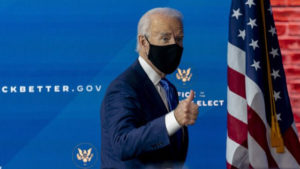 President Biden announced Tuesday that his administration would purchase an additional 200 million doses of COVID-19 vaccine as part of a plan to deliver enough inoculations for 300 million Americans by the end of the summer.
President Biden announced Tuesday that his administration would purchase an additional 200 million doses of COVID-19 vaccine as part of a plan to deliver enough inoculations for 300 million Americans by the end of the summer.
In remarks delivered from the White House, Biden said that the U.S. would purchase 100 million doses of the two-shot vaccine from Pfizer and Moderna, the two companies whose immunizations have been approved for use by the Food and Drug Administration. With that move, Biden said, the country would increase its vaccine inventory from 400 million doses to 600 million.
“This is going to help make sure governors, mayors and local leaders have greater certainty around supply so they can carry out their plans to vaccinate as many people as possible,” said Biden, speaking to a group of reporters in the White House State Dining Room.
As of Tuesday, 23,540,994 Americans had been vaccinated for COVID-19, according to the CDC, meaning that the Biden administration will have its work cut out for it to meet its summertime goal.
Biden said the federal government would be increasing weekly vaccine supply to states, territories and Native American tribal areas from 8.6 million to 10 million. Governors will be given increased transparency about the administration’s plan of action, including a three-week forecast for vaccine allocations, he added.
Biden underscored the “grim reality” that the pandemic was likely to worsen in the coming weeks and urged Americans to keep wearing masks as the government ramps up its vaccination effort.
“In the next few months, masks, not vaccines, are the best defense from COVID-19,” he said.
The pandemic is at a precarious point, health officials say, with multiple COVID-19 mutations having been identified in recent weeks and U.S. deaths from the disease expected to top 500,000 next month. Last week, top infectious disease expert Dr. Anthony Fauci told reporters that a U.K. strain believed to be twice as transmissible and more deadly than the original has been detected in over a third of U.S. states. Troubling, too, is a South African mutation of the virus that has been found to evade antibodies, which will affect the efficacy of the current vaccines. The South African variant has not yet shown up in the States, Fauci said. The chief medical officer for Moderna told the New York Times this week that the company was working on a “mutation-proof” vaccine as an “insurance policy.”
In his remarks on Tuesday, Biden directed blame for the slow rollout of the two COVID-19 vaccines to his predecessor.
“It’s not [a] secret,” he said, that the “vaccine program is in worse shape than we anticipated.”
Last week, Biden promised to deliver 100 million shots in the first 100 days of his presidency. It’s not an especially lofty goal, given that the U.S. already administers 912,000 doses per day. In fact, reporters pressed the president and his team on whether they should be aiming higher. On Tuesday, Biden claimed he was already doing that.
“I also want to be clear, 100 million shots in 100 days is not the endpoint. It’s just the start,” he said.
But as new and more infectious strains of COVID-19 continue to spread and a significant portion of Americans express reservations about receiving a vaccine — particularly in Latino and Black communities — achieving even a modest increase in immunizations could prove challenging.
Biden signed executive orders last week aimed at increasing testing and vaccination. The orders also direct more funding for the production of personal protective equipment, lay out a framework to reopen K-12 schools and tighten travel restrictions to and from the U.S.
The Biden White House has also submitted a lofty $1.9 trillion COVID relief package to Congress. Republicans, however, have balked at the price tag, and the prospect of passing the legislation remains in doubt.
“Things are going to continue to get worse before they get better,” Biden concluded, adding, “and to a nation waiting for action, let me be clearest on this point: Help is on the way.”
